
Janet Raloff
Editor, Digital, Science News Explores
Editor Janet Raloff has been a part of the Science News Media Group for more than four decades. While a staff writer at Science News, she covered the environment, toxicology, energy, science policy, agriculture and nutrition. She was among the first to give national visibility to such issues as electromagnetic pulse weaponry and hormone-mimicking pollutants, and was the first anywhere to report on the widespread tainting of streams and groundwater sources with pharmaceuticals. Her writing has won awards from the National Association of Science Writers, International Free Press Association and the Institute of Food Technologists. Over the years, Janet has been an occasional commentator on NPR's "Living on Earth" and her work has appeared in several dozen publications. She is also a founding board member of the Society of Environmental Journalists. In July 2007, while still writing for Science News, Janet took over Science News Explores (then known as Science News for Kids) as a part-time responsibility. Eventually, she expanded the magazine's depth, breadth and publication cycle. In 2013 it became her full-time job (although she still writes the occasional story for Science News). Before joining Science News, Janet was managing editor of Energy Research Reports (outside Boston), a staff writer at Chemistry (an American Chemical Society magazine) and a writer/editor for Chicago's Adler Planetarium. Initially an astronomy major, she earned undergraduate and graduate degrees from the Medill School of Journalism at Northwestern University (with an elective major in physics). She interned with the Office of Cancer Communications (NIH), Argonne National Laboratory, the Atomic Energy Commission (now Energy Department), the Oak Ridger in Tennessee and the Rock Hill Evening Herald in South Carolina.

All Stories by Janet Raloff
-
 Microbes
MicrobesThe HIV cure — that wasn’t
Immediate and aggressive drug treatment of a baby born with HIV appeared to have cured the girl. In fact, a follow-up shows, she still has the disease.
-
 Agriculture
AgricultureYour food choices affect Earth’s climate
Producing food can put a lot of climate-warming pollutants into the atmosphere. But some foods, especially meats, contribute more than others.
-
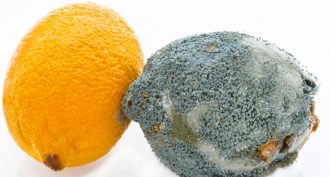 Microbes
MicrobesExplainer: Where antibiotics came from
A mold proved the source of the first known antibiotic: penicillin. But chemical dyes would lead to the first antibiotics used in treating people.
-
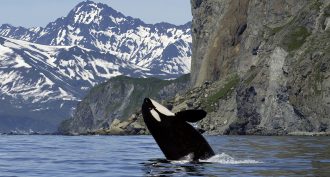 Animals
AnimalsExplainer: What is a whale?
Can a dolphin be a whale — or a whale be a dolphin? Yes, because the terms used to describe the biggest marine mammals are quite elastic and fuzzy.
-
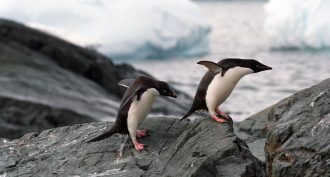 Animals
AnimalsEven penguins get the flu
Scientists have just identified ‘live’ bird flu virus in Antarctic penguins. But the infections may not be novel. There are some signs these germs have been infecting local wildlife for up to 80 years.
-
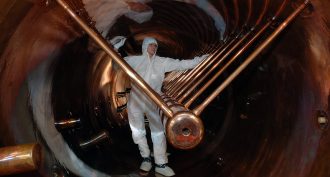 Chemistry
ChemistryScientists confirm element 117
Scientists have confirmed the existence of a new, short-lived superheavy element. For now, they’re calling it ununseptium.
-
 Animals
AnimalsThese insects thirst for tears
In some parts of the world, insects will drop by for a savory beverage. Interestingly, neither a croc — nor a scientist who offered his eyes up to ‘tear-sipping’ bees — seemed bothered much by the freeloaders.
-
 Space
SpaceFailed ‘star’ found in sun’s backyard
Astronomers have identified a failed star — or brown dwarf — right in our sun’s backyard. It doesn’t burn brightly. In fact, it doesn’t burn at all, which explains its downright frosty temperature.
-
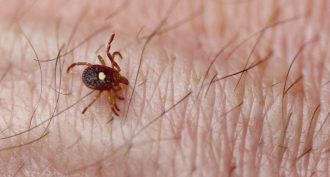 Health & Medicine
Health & MedicineNew ‘Heartland’ disease emerges in U.S. Midwest
A new viral disease causes major pain and flu-like symptoms. At present, no treatment or cure exists.
-
 Science & Society
Science & SocietyFDA announces plans to regulate e-cigarettes and more
The Food and Drug Administration announced it will use its powers to try to keep e-cigarettes, hookahs and cigars out of the hands of minors.
-
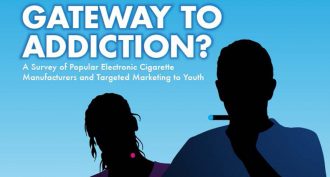 Science & Society
Science & SocietyE-cigarette makers focus on teens
A high-level group of senators and members of the U.S. House of Representatives surveyed makers of e-cigarettes and finds they are targeting youth. They conclude that new federal laws should be created to end practices that could turn teens into nicotine addicts.
-
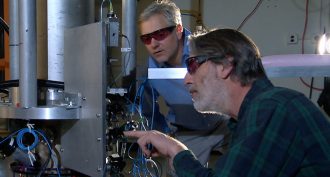 Physics
PhysicsWorld’s coolest ‘clock’ is also crazy-accurate
This is the time to beat — the world’s most accurate atomic clock ever. At its heart is a ‘fountain’ of cesium atoms chilled nearly to absolute zero!